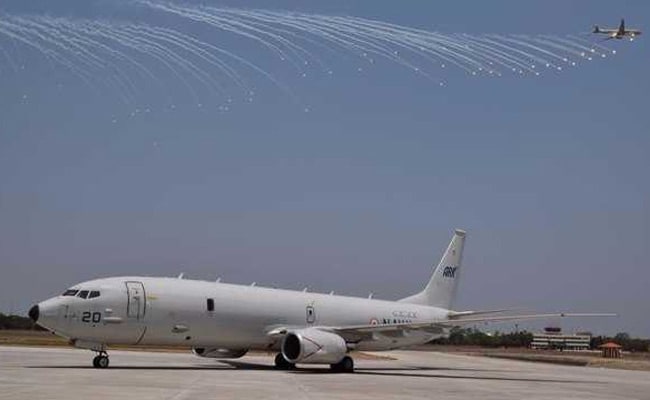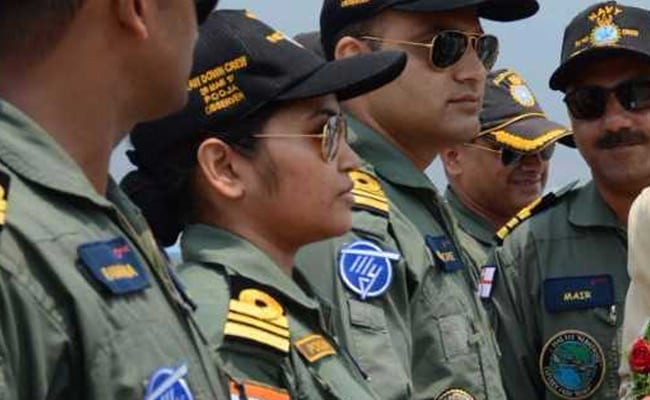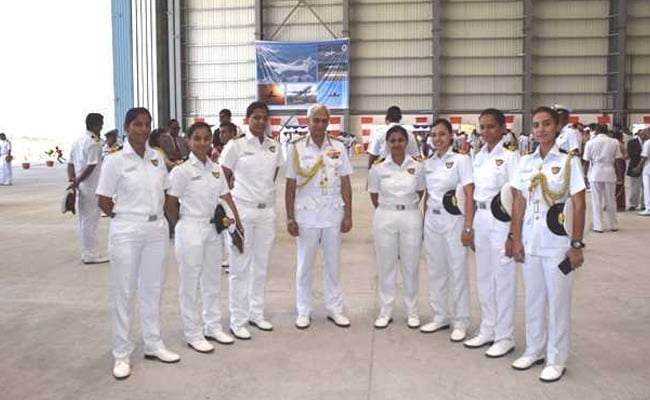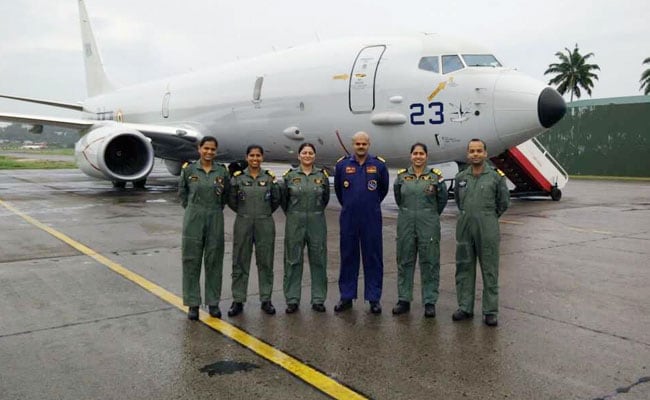Indian Navy women combatants now operate as highly skilled system specialists on P-8I anti-sub aircraft.
New Delhi:
Breaking through a glass ceiling that has existed since the Indian Navy's founding, 20 women combat aviators are now in the crew of its most sophisticated anti-submarine warfare aircraft, the US-built Poseidon 8-India (P-8I) used to detect Chinese warships and submarines in the Indian Ocean.
Eight P-8Is, which were ordered from the US in a $2.1 billion deal, are based at INS Rajali in Arakonnam near Chennai with four additional jets worth $1 billion on order from Boeing in the US.
 Thirty more women officers are posted on the less capable Russian built Ilyushin Il-38 and the license-manufactured Dornier Do-228.
Thirty more women officers are posted on the less capable Russian built Ilyushin Il-38 and the license-manufactured Dornier Do-228.
"Mission Assigned, Mission Accomplished is our motto," say their seniors.
Though women were first posted as observers on patrol aircraft in 2009, several officers are now experienced systems specialists, with the senior most woman combat aviator achieving the rank of Commander.
 The women officers on P-8s and Il-38s operate all key sensors, including weapons systems. They will be war-fighters like their male colleagues if their aircraft were to attack enemy submarines or destroy warships using torpedoes or missiles in the event of a conflict.
The women officers on P-8s and Il-38s operate all key sensors, including weapons systems. They will be war-fighters like their male colleagues if their aircraft were to attack enemy submarines or destroy warships using torpedoes or missiles in the event of a conflict.
They would also, like their male colleagues, face the very real danger of being shot down if their aircraft was hit by missiles fired from enemy warships or aircraft.
According to Vice Admiral AK Chawla, the Navy's Chief of Personnel, women officers currently on P8s "have been extremely capable. In fact, in the Services Selection Boards, inevitably the top people are the women officers. We go purely by merit."
 Earlier this month, women officers on a Navy P-8 plane played a key role in detecting an empty life-raft off the Philippines after a 57,000 ton vessel, the MV Emerald Star, went missing with 26 Indian sailors on board. Ten crew members remain missing and are presumed dead.
Earlier this month, women officers on a Navy P-8 plane played a key role in detecting an empty life-raft off the Philippines after a 57,000 ton vessel, the MV Emerald Star, went missing with 26 Indian sailors on board. Ten crew members remain missing and are presumed dead.
The rest were rescued by ships which responded to a distress call.
While emergency situations are uncommon, scouring the Indian Ocean for potentially hostile military vessels is routine for P-8I crew. Women crew spend more than four hours on each mission, monitoring sea-search radars and magnetic anomaly detectors that can track down submarines. Using the data available on their systems, they plot targets for AGM-84L Harpoon Block II missiles that can hit a target out at sea more than 250 km away. Similarly, once detected, an enemy submarine can be taken out with an Mk 54 Lightweight torpedo.
 The Navy's P-8Is and their crew are India's most capable first responders to any naval threat and are continuously deployed at a time the Chinese Navy has significantly stepped up its presence in the Indian Ocean. Chinese Navy nuclear attack submarines have been spotted in Karachi in Pakistan and China maintains a Naval logistics hub in Djibouti in the Horn of Africa.
The Navy's P-8Is and their crew are India's most capable first responders to any naval threat and are continuously deployed at a time the Chinese Navy has significantly stepped up its presence in the Indian Ocean. Chinese Navy nuclear attack submarines have been spotted in Karachi in Pakistan and China maintains a Naval logistics hub in Djibouti in the Horn of Africa.
Earlier this year, Admiral Harry Harris Jr., the Commander of the United States Pacific Command, said China was increasingly in a position to sail an aircraft carrier into the Indian Ocean any day it chose to. In the process, "India should be concerned about the increased Chinese influence. If you believe there is only a finite amount of influence in the region, then whatever influence that China has is influence that India doesn't have.''
The Navy is the second service after the Indian Air Force to enlist women officers in a combat role. In 1999, Flight Lieutenant Gunjan Saxena and Flight Lieutenant Srividya Rajan flew their tiny Cheetah helicopters in the Kargil war zone, where they came under fire from Pakistani forces. More recently, the first batch of women fighter pilots of the Indian Air Force completed their training and will now be deployed operationally in a MiG-21 squadron. Though women are not deployed in combat roles in the Army, the first batch of women are being inducted in the military police with Army Chief General Bipin Rawat calling it the start of the process to bring in women to serve in combat. At the moment, women who join the Army work as engineers, doctors, lawyers, teachers or signals officers.
While combat roles for women in the navy is a big step forward for gender parity, the force is still reluctant to have women serve on its warships in significant numbers. The design of warships, sleeping quarters and bathrooms on Navy ships cater only to men though the latest generation of ships, including the indigenous Shivalik class destroyers, do have space to accommodate both sexes.
Eight P-8Is, which were ordered from the US in a $2.1 billion deal, are based at INS Rajali in Arakonnam near Chennai with four additional jets worth $1 billion on order from Boeing in the US.

Indian Navy's cutting edge - The P8-I anti-submarine warfare aircraft.
"Mission Assigned, Mission Accomplished is our motto," say their seniors.
Though women were first posted as observers on patrol aircraft in 2009, several officers are now experienced systems specialists, with the senior most woman combat aviator achieving the rank of Commander.

Indian Navy women combatants operate state-of-the-art anti-submarine aircraft.
They would also, like their male colleagues, face the very real danger of being shot down if their aircraft was hit by missiles fired from enemy warships or aircraft.
According to Vice Admiral AK Chawla, the Navy's Chief of Personnel, women officers currently on P8s "have been extremely capable. In fact, in the Services Selection Boards, inevitably the top people are the women officers. We go purely by merit."

Women were first posted as observers on patrol aircraft in 2009
The rest were rescued by ships which responded to a distress call.
While emergency situations are uncommon, scouring the Indian Ocean for potentially hostile military vessels is routine for P-8I crew. Women crew spend more than four hours on each mission, monitoring sea-search radars and magnetic anomaly detectors that can track down submarines. Using the data available on their systems, they plot targets for AGM-84L Harpoon Block II missiles that can hit a target out at sea more than 250 km away. Similarly, once detected, an enemy submarine can be taken out with an Mk 54 Lightweight torpedo.

Women crew spend more than four hours on each mission
Earlier this year, Admiral Harry Harris Jr., the Commander of the United States Pacific Command, said China was increasingly in a position to sail an aircraft carrier into the Indian Ocean any day it chose to. In the process, "India should be concerned about the increased Chinese influence. If you believe there is only a finite amount of influence in the region, then whatever influence that China has is influence that India doesn't have.''
The Navy is the second service after the Indian Air Force to enlist women officers in a combat role. In 1999, Flight Lieutenant Gunjan Saxena and Flight Lieutenant Srividya Rajan flew their tiny Cheetah helicopters in the Kargil war zone, where they came under fire from Pakistani forces. More recently, the first batch of women fighter pilots of the Indian Air Force completed their training and will now be deployed operationally in a MiG-21 squadron. Though women are not deployed in combat roles in the Army, the first batch of women are being inducted in the military police with Army Chief General Bipin Rawat calling it the start of the process to bring in women to serve in combat. At the moment, women who join the Army work as engineers, doctors, lawyers, teachers or signals officers.
While combat roles for women in the navy is a big step forward for gender parity, the force is still reluctant to have women serve on its warships in significant numbers. The design of warships, sleeping quarters and bathrooms on Navy ships cater only to men though the latest generation of ships, including the indigenous Shivalik class destroyers, do have space to accommodate both sexes.
Track Latest News Live on NDTV.com and get news updates from India and around the world

